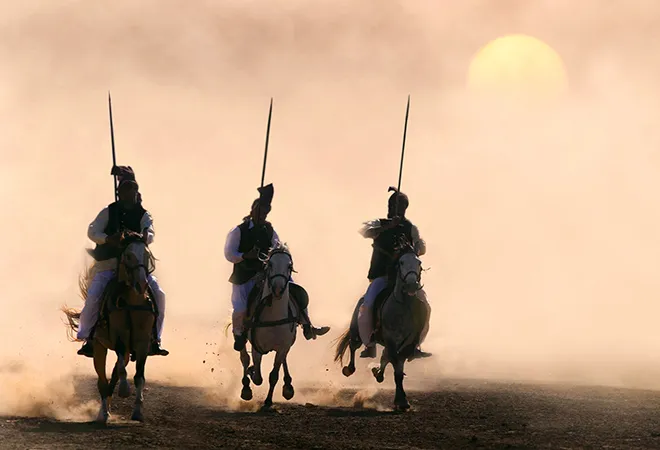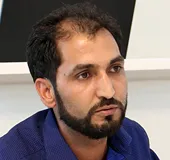
Over the past four months, Pakistan’s Prime Minister Imran Khan is facing one of his difficult political challenges as major opposition parties have come together under the Pakistan Democratic Movement (PDM) alliance to kickstart a nation-wide agitation against his rule. Demanding Imran’s resignation, the PDM has announced a three-phased action plan, which includes country-wide protests, public meetings and rallies, culminating in a “decisive long march” in January 2021 in Islamabad.
In their joint online address to the PDM, former President Asif Ali Zardari and deposed Prime Minister Nawaz Sharif announced the alliance’s 26-point declaration of demands. Nawaz Shareef used the PDM’s first-ever power-show in Gujranwala to settle scores with the strong army establishment of the country. Delivering his message through a video-link from London, Shareef accused the army of bringing down his government and clandestinely paving the way for Imran Khan becoming the Prime Minister.
It also is a clear message to Pakistan’s all-powerful military establishment that their warnings no longer have any impact on the antagonistic mood of the combined opposition.
Coming after the warnings of the nation’s military and intelligence chiefs to the opposition leaders not to drag democratic institutions into petty political issues and cautioning them against creating chaos and civil disturbance, Sharif’s accusation is a clear indication of the opposition unity. It also is a clear message to Pakistan’s all-powerful military establishment that their warnings no longer have any impact on the antagonistic mood of the combined opposition.
Dual policy
From the inception of independent Pakistan, civilian governments have continued to largely remain under the influence of the military. Such has been their interference that the military has also come to be recognised as Pakistan’s centre of power by global powers, including the US and China. As Imran Khan became Prime Minister with the help of army establishment, through reported rigged elections, its grip over the civilian government, especially under the current Chief of Army Staff (COAS), Gen. Qamar Javed Bajwa has increased manifold.
The direct control gained by the military on the civilian government has given an impression that the affairs of the state are managed by the army even without declaration of martial law or army rule. From the installation of Imran’s Tehreek-e-Insaf (PTI) party’s rule, key civilian sectors, including civil aviation, public health, and power regulator, are headed by serving or retired military officials.
The direct control gained by the military on the civilian government has given an impression that the affairs of the state are managed by the army even without declaration of martial law or army rule.
The PTI government also appointed former army official Lt. Gen. Asim Saleem Bajwa to head the Prime Minister’s media management team to control the national media and their narrative. Furthermore, Imran Khan also gave a three-year extension to Gen. Bajwa despite concerns raised by the judiciary.
The army top-brass used their increased influence in the civilian government as an opportunity to unleash a corruption spree. According to an August 2020 report, Lt. Gen. Asim Saleem Bajwa and his family have allegedly amassed tonnes of undisclosed wealth during his tenure. He used his office to set up offshore assets with his wife and brother.
The report further alleges that some of the power projects were awarded without following due tendering process at 237 percent cost than other similar projects in neighbouring countries like India. Similar wrongdoings were also highlighted about two coal-based power plants.
Such is the control of the military over the current civilian dispensation that Imran Khan maintained stoic silence on the exposé and even refused to accept Saleem Bajwa’s resignation till 12 October 2020.
Amidst the furore from the opposition parties in the light of this report, Saleem Bajwa stepped down as the special assistant to the Prime Minister on information and broadcasting, but continues to remain chairman of the China-Pakistan Economic Corridor (CPEC) Authority — an institution that is being used by military establishment as a conduit of further corruption.
Such is the control of the military over the current civilian dispensation that Imran Khan maintained stoic silence on the exposé and even refused to accept Saleem Bajwa’s resignation till 12 October 2020. The PTI government on the other hand used the National Accountability Bureau (NAB) to increase the persecution of opposition leaders on the pretext of accountability and corruption.
The anti-corruption drive remained the centrepiece of the PTI government, which used the NAB to frame charges against many political leaders, including the Sharifs, former President Asif Ali Zardari, the Jamiat Ulema-e-Islam (JUI-F) group led by Fazl-ur-Rehman, and several members of each of their families. The NAB has recently framed charges against Shahbaz Sharif, the brother of Nawaz Sharif, in a money laundering case of whopping $41.9 million.
Under the PDM, the opposition has joined hands to expose the unholy marriage of convenience between Imran Khan and the army establishment.
The blatant use of the NAB by the PTI government galvanised the opposition to create an alliance. Under the PDM, the opposition has joined hands to expose the unholy marriage of convenience between Imran Khan and the army establishment. The PDM has even demanded the sacking of Saleem Bajwa and a transparent investigation in the way it was done in the case of the opposition politicians.
Challenging times ahead
After back-to-back mass rallies in Gujranwala and Karachi by the 11-party strong opposition under the banner of PDM, Imran Khan and military establishment have started to feel the heat. The PDM is directly attacking the military establishment by dismissing the PTI government as its puppet, rubber stamp. Nawaz Sharif even went one step further and said via the video link, “our struggle is not against Imran Khan. Today, our struggle is against those who installed Imran Khan and who manipulated elections to bring an inefficient man like him into power and thus destroyed the country.” This direct criticism of the military establishment has made things worse for both Bajwa and Imran Khan at the time when the country is reeling under multiple socio-economic shocks triggered by inflation, increase in terrorist incidents, non-implementation of the National Action Plan (NAP) on terrorism and sectarian divide.
The aggression shown by PM Khan and his PTI government to break the opposition with a series of arrests and tougher measures are only worsening the current situation. After the second show of strength at Karachi by the PDM, the PTI government tried to intimidate the opposition by arresting retired Captain Mohammad Safdar, the husband of PML-N vice-president Maryam Nawaz, from hotel on charges of “violating the sanctity of the Quaid's mausoleum.”
The aggression shown by PM Khan and his PTI government to break the opposition with a series of arrests and tougher measures are only worsening the current situation.
As the province of Sindh is ruled by one of the main opposition parties, the Pakistan People’s Party (PPP), the arrest was done so that the entire blame could be shifted to the Sindh government and police with an aim to divide the opposition. According to reports, when police refused to make the arrest, the Rangers kidnapped the IGP, who was forcibly “taken to the sector commander's office and asked to sign on the arrest orders.”
Following the mounting pressure from opposition parties, COAS Gen. Qamar Javed Bajwa ordered an enquiry into the arrest of Mohammad Safdar and even talked to the chief of the PPP. The army establishment is trying to balance its acts as generals want to avoid controversy. The next few months are critical as to how Imran Khan manages the army bosses and creates rifts within the PDM to save his government.
This essay originally appeared in South Asia Weekly.
The views expressed above belong to the author(s). ORF research and analyses now available on Telegram! Click here to access our curated content — blogs, longforms and interviews.




 PREV
PREV


